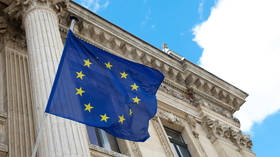European markets hit by election turmoil

European stocks slid on Monday as traders reacted to initial results from the EU Parliament elections and the surprise decision by French President Emmanuel Macron to call a snap election.
The EU parliamentary elections concluded on Sunday after four days of voting. Exit polls have indicated a shift towards support for far-right and conservative parties – including Macron’s centrist Renaissance alliance being trounced by Marine Le Pen’s far-right National Rally group.
On Monday, France’s CAC 40 stock index dropped 2% to its lowest since February, after Macron announced on Sunday that he was dissolving the National Assembly, the lower house of the French parliament, and calling a snap general election. The country’s banks and utilities have been hit particularly hard, with Societe Generale and BNP Paribas shares plummeting 7.8% and 4.7%, respectively.
The pan-European Stoxx 600 index was down 0.4%, with construction stocks leading the losses, falling 1.5%.
The euro slipped 0.6% to a one-month low of $1.0733 and 0.4% against the British pound in the wake of the news.
In France, the right-wing National Rally, previously led by Le Pen, received more than 30% of the vote, while Macron’s Renaissance party only managed around 15%, prompting his shock call for a general election.
“The snap election called in France has added to the uncertain tides swirling around financial markets,” Susannah Streeter, head of money and markets at stockbroker Hargreaves Lansdown, told the AFP.
“Investors are assessing Macron’s gamble in attempting to reassert his authority after voters shifted en masse to the far-right during the EU elections, in both France and Germany,” she said.
Scope Markets analyst Joshua Mahony told the outlet that it was “no surprise” to see weakness across French stocks amid increased uncertainty.
France will go to the polls for a new National Assembly on June 30, with a second round on July 7.
In Germany, Chancellor Olaf Scholz’s centrist party had its worst ever result with 14% of the vote, according to projections. Meanwhile, the right-wing Alternative for Germany (AfD) is expected to finish second with an estimated 15% of the vote, trailing the center-right CDU/CSU alliance, which is estimated to have won around 30%. Germany’s DAX dropped 1% on Monday in light of the news.
Right wing parties also won in Italy and Austria.













